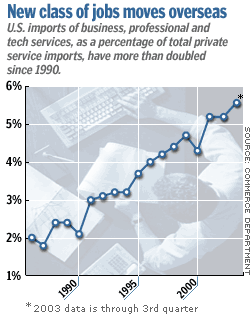NEW YORK (CNN/Money) -
U.S. companies that move jobs overseas to cut costs may not be saving as much money as their executives think.
In a survey of 500 human resources executives by Hewitt Associates (HEW: Research, Estimates), a global outsourcing firm based in Illinois, 92 percent of the firms that had moved jobs overseas said they did so to cut costs.

But according to the study, many companies are ignoring some of the problems of offshoring, which offsets ostensibly cheaper labor costs.
For example, Hewitt found, less than half of those companies had studied the tax environments of the countries in which they were thinking of putting operations. About 75 percent had studied the impact on supply chain costs and only 34 percent considered the expense of shutting down U.S. facilities -- costs that could be eating up some of the money saved by cheaper labor.
"For most companies, the model is still new, so there are challenges, especially in the areas of accurately assessing costs and concerns around talent, that have yet to be addressed, resulting in decreased value and return on investment," Hewitt analyst Mark Harian said in a press release.
Hewitt did not offer any estimates of the potential impact of these costs on corporate profitability.
Not a new phenomenon
Offshore outsourcing of U.S. jobs is not a new phenomenon, but technological advances and the availability of skilled workforces in nations such as China and India have led to higher-skilled jobs -- especially in information technology -- moving overseas in greater numbers.
| Related stories
|

|
|
|
|
Statistically speaking, offshoring has not been a major factor in the U.S. labor market's prolonged slump, the longest since 1939. Even so, the trend has become a source of great anxiety for U.S. workers and a hot-button political topic -- and it looks like it's here to stay.
Some 45 percent of the 500 firms Hewitt surveyed have overseas operations, and 71 percent of the remaining companies plan to move some jobs abroad by 2005.
| 
| |

| 
| 
|

|
 Big corporations are taking a lot of heat for outsourcing jobs, but they're not the only ones. More and more small businesses are jumping on the outsourcing bandwagon. CNNfn's Kathleen Hays reports. Big corporations are taking a lot of heat for outsourcing jobs, but they're not the only ones. More and more small businesses are jumping on the outsourcing bandwagon. CNNfn's Kathleen Hays reports.
|
 Play video
Play video
(Real or Windows Media)
|
| 
|

|
|
Hewitt said it expects that the percentage of jobs being offshored will roughly double in the next three years. An average of 13 percent of jobs at each company are already located offshore, according to the survey, and an additional 12 percent could be relocated within the next three years.
And the trend has gathered steam in recent years. Of the firms who are currently using offshore labor, 29 percent began doing so in the years 1995-99, while 43 percent began in 2000-03, Hewitt said.
IT operations are most often offshored, followed by customer relations, manufacturing and supply chain operations, according to the survey. In the next three years, companies will likely move more finance, accounting and HR jobs overseas.
Hewitt said finance executives consider the management of transition to overseas labor the hardest part of global outsourcing, followed by maintaining corporate culture and personnel management. HR executives tend to focus more on legal and regulatory challenges, Hewitt said, along with cultural barriers, labor pool quality and backlash from home country employees.
 |
YOUR E-MAIL ALERTS
|
Follow the news that matters to you. Create your own alert to be notified on topics you're interested in.
Or, visit Popular Alerts for suggestions.
|
|
|
The firms surveyed didn't believe their brand image had suffered as a result of offshoring, however. Just 11 percent of those surveyed saw a negative impact on their brand. Thirty percent said morale in their home country suffered as a result of offshoring.
Many of the firms surveyed did express concern about the impact of outsourcing on U.S. unemployment, along with worries about supply chain problems, quality issues and political instability in their overseas locations.

|

